The changing facades along Wilson
By Tim Lambrinos
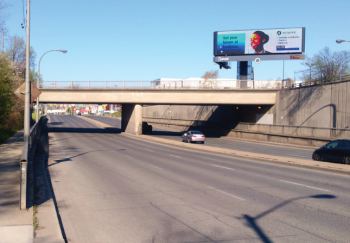
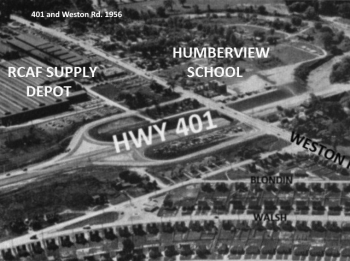
New streets get created as times continue to change.
Expressways are paved and older communities vanish before our eyes. New businesses pop up but sometimes live out their existences only to be deemed obsolete in today’s ever-changing consumer marketplace.
This has been the storyline behind the ongoing cycle of transformation at Weston and Wilson over the past 70 years. Along this corridor, there continues to be a series of considerable makeovers, even to this day. 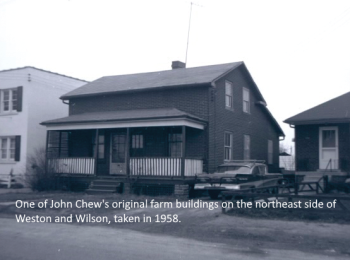
The long awaited traffic lights at Matthews Gate and Wilson Avenue have recently been installed but they are neither hooked up, nor are they operational yet.
The Emery Village BIA is doing their part to spruce the corridor up a bit with plans for a makeover at the intersection of Clayson Rd. and Wilson. However, construction plans may have to be delayed as a result of unexpected circumstances caused by the latest coronavirus crisis.
For local history buffs, it seems that a reoccurring theme of industrialized change actually began in the area with John Chew’s toll bar in 1848.
The bar was located at the intersection of Weston Road and Wilson where Chew operated a toll booth during the late 1800’s. Another older example of a thriving business that disappeared from the area was the 1930’s Booth Brick Factory on Marmora Street.
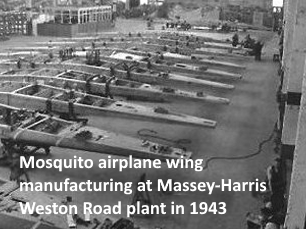
There have been other businesses that no longer operate along this stretch of Wilson.
On Weston Road in the 1930’s, a gigantic Massey-Harris tractor assembly plant manufactured Mosquito aircraft wings for the war effort.
In April of 1948, the plant was managed by the Royal Canadian Air Force (RCAF) as a supply depot for the expansion of the Downsview Airbase at Sheppard and Keele. The nationally-run supply depot was located on the east side of Weston Road and south of Hwy 401. It is where Canadian Tire and the Crossroads Plaza exist today. The facility was named the RCAF No. 1 supply depot detachment. However, all storage operations were reassigned to other locations in September of 1953. During the remainder of the fifties and early sixties, official training exercises were held for air cadets at the former plant.
As far as accommodation for area residents went, a major addition to the community known as Humberlea occurred between 1950 and 1954. Seven new streets and a school were all added to the subdivision and were built on the former farmland of the Caulfield Dairy Farm. New residential street names emerged in Walsh Avenue, Blondin Avenue, Yorkdale Crescent, Lovilla Boulevard, Melody Road, Ann Arbour Road and lastly Jodphur Avenue.
By 1963, it became apparent that the CPR railway crossing at Wilson Avenue also required a re-design as a result of ongoing safety concerns. Transportation officials assessed that a vehicle underpass was needed since the existing level crossing had poor site lines for any vehicles emerging off Ann Arbour Road.
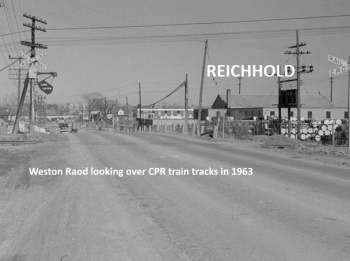
In 1964, 10 existing homes on the north side of Walsh Avenue were expropriated in order to accommodate the new railway underpass completed later that year.
Dr. Joseph Leventhal lived in one of the homes on Walsh Avenue at Ann Arbour Road. Leventhal had built an addition to the rear of his home in order to run his medical practice. The doctor was known to have rented office space to other business professionals there as well.
After Leventhal’s house was knocked down, he relocated his practice to Wilson and Lexfield Avenue, east of Jane Street.
Three years after this, it became apparent that access into the subdivision was significantly hindered since there was no longer an outlet street (Ann Arbour) that connected to Wilson.
In 1967, two homes on Walsh and two on Yorkdale were demolished to create a new inlet road named Matthews Gate.
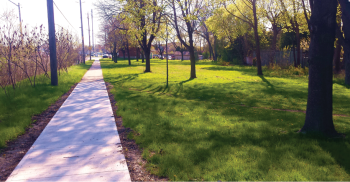
Along Wilson, east of the CPR tracks, there was a chemical factory in full operation since 1948.
Reichhold Chemicals Canada was located on the southwest corner of the intersection of Wendell and Wilson. Their factory specialized in manufacturing polymer materials, resins and paint additives.
Since 2007, Reichhold Chemicals moved their operation to Mississauga and a new business has emerged in its place. Kooy Brothers Equipment now operates at the location and specializes in retail for industrial lawn mowers, commercial grade landscape equipment, snow removal tractors and other construction equipment.
It seems that there is always going to be change along this distinctive section of Wilson. But now more than ever it appears that the historical name, known to many as the Blondin Loop, will continue to be only part of local area folklore.
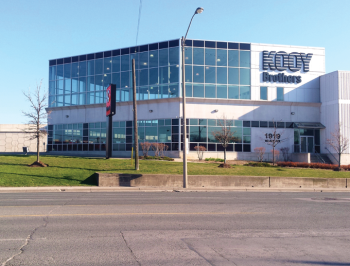
Alas, as with many things that have come and gone, all that’s left behind sometimes are the memories themselves.
It’s not easy to accept that change, prosperity, growth and progress can be considered positive and important elements of a growing economy. These persistent elements of change remain optimistic as they go through the revolving door of transformation along this section of Wilson Avenue.
As a reminder to all local residents of the Humberlea area, Bryan Gordon is planning a reunion in 2021 that will commemorate the 70th anniversary of Melody Road Public School for all former students that lived in Humberlea and attended the school from 1951 to 1986. Once again, the Emery Village Voice extends thanks for his assistance with this article. For information about the Melody Road Public School reunion, please contact Bryan Gordon at: bgordon1949@gmail.com














